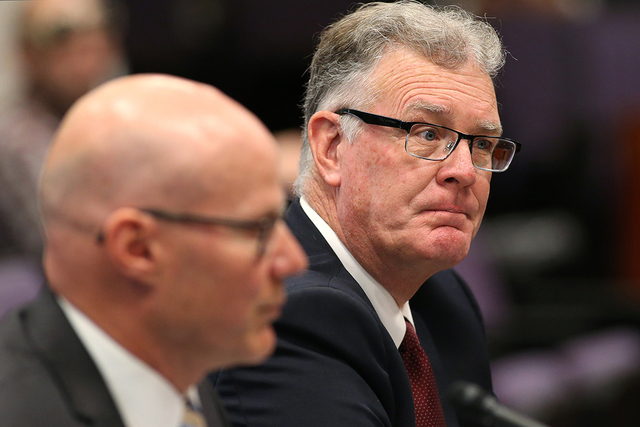Lawmakers talk ‘home rule’ for jurisdictions

CARSON CITY — Local governments want to be able to make more decisions for their communities on their own without first getting permission from state lawmakers.
While city and county officials Monday said Senate Bill 11 would allow them to act more quickly when issues arise, not everyone was convinced giving them expanded powers is a good thing.
For more than a century, Nevada has functioned under Dillon’s Rule, which says states control what powers are granted to local jurisdictions.
SB11 would allow cities and counties to make “functional” rules on their own provided they are not expressly prohibited or limited by other laws.
Sen. Pete Goicoechea, R-Eureka, stressed that the measure doesn’t include new taxing powers for local jurisdictions.
“As far as I’m concerned this is about functional home rule, not necessarily fiscal,” said Goicoechea, chairman of the Senate Government Affairs Committee and a former Eureka County commissioner.
“They can’t impose a tax,” he said, adding that restrictions on local governments currently in statute would remain.
“If you need permission from the Legislature … that stays in place,” Goicoechea said.
Nevada cities and counties have tried for years to loosen the apron strings with state lawmakers, who meet only every two years.
Wes Henderson, with the Nevada League of Cities and Municipalities, said the bill “would not eliminate or weaken any of the hundreds of statutes that control local governments.”
“One problem with Dillon’s Rule is you don’t know you have a problem until you have a problem,” he said.
Backers of the bill cited examples such as prohibiting jail inmates from having cell phones. That required legislative approval.
Sen. Kelvin Atkinson, D-North Las Vegas, said he wasn’t convinced the bill would prevent local governments from imposing fees.
The trucking and manufacturing industries also opposed the measure, fearing it would lead to different rules throughout the state, or subject them to varying fees from one jurisdiction to another.
No action was taken on the bill and amendments were likely.
Earlier in the day, local officials briefed members of the Assembly Government Affairs committee on their finances and revenue streams.
While they’ve weathered the economic downturn by cutting budgets and services, they don’t expect their biggest revenue source to return to peak performance for a decade or two.
Officials from the cities of Henderson, Sparks and Washoe County said property taxes make up the bulk of their revenues, with their biggest expense being public safety.
A 3 percent annual cap on residential property taxes was enacted in 2005 to protect seniors and others from skyrocketing increases when Nevada’s housing market was red hot and prices were soaring. But property values plummeted during the Great Recession and local governments say it will take decades for their coffers to recover.
“Property taxes have stabilized in recent years, but the property tax cap means the revenues will take between 11 to 25 years to recover, depending on the areas of the city,” Henderson City Manager Jacob Snow said.
A special Henderson budget ad hoc committee last year recommended increasing the city’s property tax rate by 20 cents, which would take it to 91 cents per $100 of assessed valuation and raise $19 million annually.
Snow said even with the increase, Henderson would still have the lowest property tax of Nevada’s four largest cities. The added revenue would be used to alleviate a backlog of capital and infrastructure projects that have essentially been ignored during the economic downturn.
“We slashed our capital budget. We essentially don’t have a capital budget anymore,” he said.
Property taxes in Henderson make up 25 percent of general fund revenues. Henderson has seen its property tax revenue drop from a high of $83.4 million in fiscal year 2009 to an estimated $58.5 million for the current fiscal year ending June 30.
After his presentation to the Assembly committee, Snow said no decision has been made on whether the city will actually seek a property tax increase. He said that depends on other tax decisions legislators might enact.
Contact Sandra Chereb at schereb@reviewjournal.com or 775-687-3901. Find her on Twitter: @SandraChereb